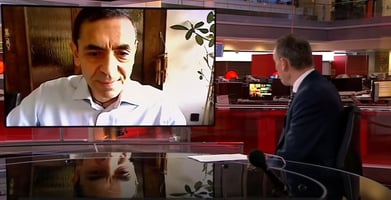We've reached the final day of our look back at the best interviews and spokespeople of 2020.
We always stress the importance of personal examples, anecdotes and stories in interviews on our media training courses.
They bring interviews to life, help to influence the direction of the conversation and play a crucial role in interviewees connecting with those watching, listening and reading.
And there was a great example of how this should be done in an interview this week.
Professor Ugur Sahin, chief executive of BioNTech and one half of the couple behind the leading covid vaccine, appeared on the Marr programme on Sunday.
There was much to like about his performance, which you can view here at about 21:50. And, of course, it was good to hear more about the vaccine.
#Marr: Will society be back to normal by spring 2021?
— BBC Politics (@BBCPolitics) November 15, 2020
BioNTech founder Prof Uğur Şahin: "We can have a normal winter next year" if a high vaccination rate is achieved by autumn
Covid-19 https://t.co/yuuSb1O1wa pic.twitter.com/4ho76VHX0x
But it was his description of the phone call telling him whether the vaccine was successful that captured our attention.
“I knew that we would get a call at eight providing us with the answer,” he told presenter Andrew Marr.
“And I got the call from Albert Bourla, the CEO of Pfizer who is a good friend and he asked me if I would like to know if the trial is positive.
“I said ‘no’, but then I said ‘of course’. He said ‘sit down’ and then provided me with the information that the trial is positive, which was extremely relieving.
“As a scientist, of course, you expect a certain likelihood that the trial would be positive based on the data we had so far. But there are always unknown factors, and it could be that there is a scientific, medical or biological reason why the vaccine does not work.
“But we now know that our vaccine works and most likely that other vaccines will work as well. So, this is really a message that not only changes the way we develop vaccines but also increases the chances of getting this virus under control.”
Marr then followed that up by asking how he celebrated.
“We did not have a lot of opportunity to celebrate,” Prof Sahin said. “I just discussed the results with my wife and how fantastic it is – it is an extraordinary result – and had a tea together and just looked back at the last month until we got this data and of course it provides joy.”
When the presenter suggested that British people would be “delighted” he celebrated with a cup of tea, Prof Sahin added: “This is not only British, it is also Turkish.”
It is a great exchange, packed with details and a touch of humour. And it helps to show the human side of the people behind the vaccine. As we say on our media training courses, people want to hear about other people.
It certainly seemed to resonate with those watching.
BREAKING: Husband-and-wife scientists Sahin & Oezlem Tuereci celebrated cracking the covid-19 vaccine.. with a cup of tea!! Brilliant interview. #marr pic.twitter.com/bRLViDNUkc
— Piers Morgan (@piersmorgan) November 15, 2020
Great interview on #marr this morning with Prof Uğur Şahin. This humble, brilliant man celebrated his vaccine breakthrough with a cup of tea ☕️! https://t.co/dzt6y2Oo4a
— Angie Shatford (@angie_shatford) November 15, 2020
Excellent interview with Dr Ugur Sahin on #marr this morning - he and his wife are the developers of the Biotech / Pfizer vaccine against#COVID19. When the news came through that the vaccine was 90% effective against the virus, he and his wife celebrated with a cup of tea!
— Derek Connelly (@ProfDConnelly) November 15, 2020
What a fantastic interview given by Prof. Ugur Sahin on #Marr on their mRNA coronavirus vaccine. Thoughtful, considered, highly informative and modest. The very antithesis of much we hear and see. Wonderful.
— ᴅᴀᴠɪᴅ ʟʟᴇᴡᴇʟʟyɴ FRSA 🏴 (@DrDaiLlewellyn) November 15, 2020
Now, you might be thinking Mr Marr was asking pretty easy questions. So, it is worth pointing out that there were more challenging ones asked either side of this exchange and that they were handled well, with a clear impression of openness and honesty.
But it is these innocuous-sounding questions that can often cause spokespeople the most trouble, particularly when they have a personal element.
You can probably recall, for example, the difficulty Theresa May has when she was famously asked what was the naughtiest thing she had done as a child. Another memorable one saw Francis Maude appear on the radio to discuss a volunteering initiative and becoming completely lost for words when he was asked what volunteering work he did.
Effective spokespeople are those that prepare for the difficult questions and wider issues that could be brought into an interview. But they also need to be able to think quickly and respond to the innocuous and personal questions, without sounding muddled, evasive, robotic or saying something that becomes a distraction.
There is a risk that spokespeople are so focused on their message and anticipating the tricky questions that they struggle with anything that goes beyond these areas.
Prof Sahin’s tea-drinking anecdote sounded completely natural in this interview. But it is worth highlighting he had previously used it in print interviews, including with the Guardian, New York Times and Washington Post. This suggests he was well-prepared for this type of question and knew he had an anecdote that worked well.
If you don’t fancy facing a question like this, the best way to avoid it being asked is by sharing personal stories and examples from the start of the interview.
If you add the colour and human warmth, then the journalist will not need to go searching for it.
About to face the media? Get your media interview homework off to the best start by downloading your copy of our free media interview preparation eBook.
Media First are media and communications training specialists with over 35 years of experience. We have a team of trainers, each with decades of experience working as journalists, presenters, communications coaches and media trainers.
Subscribe here to be among the first to receive our blog.




